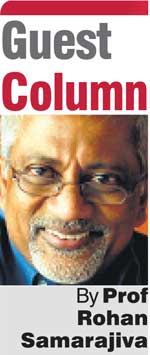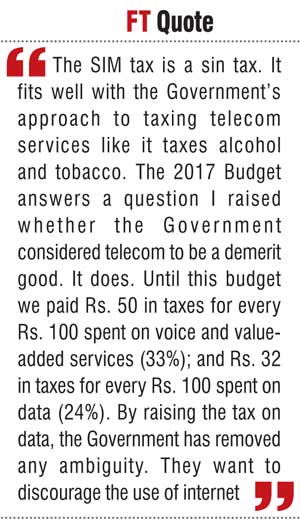Monday Feb 23, 2026
Monday Feb 23, 2026
Friday, 18 November 2016 00:00 - - {{hitsCtrl.values.hits}}
The core purpose of a Budget is to set government revenues and expenditures. By delivering an economic statement prior to the Budget Speech, the Prime Minister, in his capacity as Minister of National Policies and Economic Affairs, has separated the policy setting function.
Under the Gazette assigning subjects and functions (1933/13 dated 21 September 2015), the Minister of Telecommunication and Digital Infrastructure has been tasked with “formulation of policies, programs and projects, monitoring and evaluation in regard to the subjects of telecommunication and digital infrastructure”. A well-resourced Telecom Regulatory Commission has been existence for many years, with responsibility for implementation and regulation. 
But apparently, the Finance Minister has not got the memo.
He is intruding into granular policy formulation and implementation: “In support of the country’s digitalization process, all mobile telephone operators will be given a six months period to convert their infrastructure to provide at least 3G coverage. Any operator who failed to implement within this period will be liable for a surcharge of Rs.100 million per District. All metro areas are required to be converted to 4G by 30th June 2018.”
One would think such conditions would be attached to spectrum licenses at the moment of license issuance or would be imposed after due consultation by the Telecom Regulatory Commission as provided by law.
The Finance Ministry acting outside the procedure laid out in law casts a pall on investment by stripping out any semblance of regulatory certainty. It is no longer possible to excuse the arbitrary and confiscatory actions of the Finance Ministry in 2015 as being atypical. Two years in a row is a pattern.
Spectrum fees are set by the Telecom Regulatory Commission, under the provisions of the Sri Lanka Telecommunications Law No. 25 of 1991, as amended, and the fees go to the fund established under the authority of that Act. The Minister of Finance will have none of that. He has decreed that the fees will be increased by 25% with effect from 1 January 2017. I guess it is consistent with the fact that under another part of the budget he proposes to expropriate the fund wholesale and ask the TRC to ask for money as needed.
The questions are whether the Act will be amended before 1 January 2017? And whether there is any point in keeping the TRC, since its functions are being directly performed by the Ministry of Finance?
Now we come to what actually belongs in the Budget: taxes. 
“It has been observed that more than 150,000 SIM cards are sold monthly. I propose to charge a SIM Card Activation Levy (SCAL) of Rs. 200 per SIM to discourage the use of mobile connections temporary for fraudulent and criminal activities.”
The rationale is one of the funniest in the Budget Speech. I was trying to imagine a criminal desisting from the purchase of a SIM because it costs 200 rupees.
It may, on the other hand, have an impact on the students who want to use the free tabs that are promised under the same budget. Why humor us with nonsensical justifications? Isn’t it simpler to give a short answer like Willie Sutton did when he was asked why he robbed banks: “that is where the money is.”
The SIM tax is a sin tax. It fits well with the Government’s approach to taxing telecom services like it taxes alcohol and tobacco.
The 2017 Budget answers a question I raised whether the Government considered telecom to be a demerit good. It does.
Until this budget we paid Rs. 50 in taxes for every Rs. 100 spent on voice and value-added services (33%); and Rs. 32 in taxes for every Rs. 100 spent on data (24%). By raising the tax on data, the Government has removed any ambiguity. They want to discourage the use of internet.
I invite readers to reconcile the budget proposals with the Prime Minister’s economic statement of 27 October 2017: “The digital economy will empower our nation – through providing affordable and secure Internet connectivity to every citizen in any part of Sri Lanka, removing barriers for cross-border international trade.”